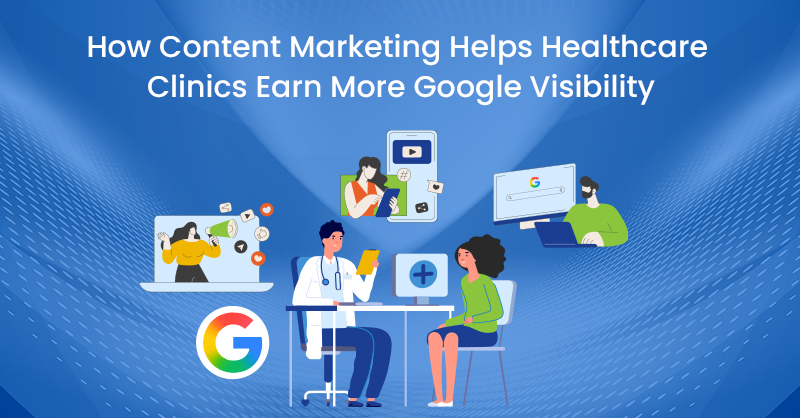Why Google Visibility Matters for Healthcare Clinics
When people have a specific health concern, their immediate response is to search for answers online. They will often look at clinics or practitioners who show up in the top search results. For this reason, it’s pivotal to be visible on Google. The more relevant keywords are targeted in your healthcare SEO strategy, the more likely you are to reach a wider audience and boost conversions, whether that be in the form of booking an appointment or filling out an online form.
Integrating high-impact content into your healthcare marketing strategy is just as important as SEO. After all, Google prioritizes content that adheres to its E-E-A-T principles and is well-written and researched, whereas it flags lower-quality content as spammy. When prospective patients find valuable information on a website that properly addresses their search queries, not only does this establish the clinic as a subject matter expert in their field, but it also fosters a strong relationship with the target audience, one built on trust.

Source: Shutterstock
How Content Marketing Powers Healthcare SEO Success
Now that you know why it’s important to ensure that your clinic achieves high visibility on Google, let’s examine how content marketing paired with healthcare SEO can get your services on patients’ radar. Take a look at the following points below:
1. Increases Keyword Rankings for Core Medical Services
In healthcare marketing, it’s paramount to include appropriate keywords when creating content for your clinic. As touched on earlier, keywords are responsible for elevating your rankings on search engines and expanding your overall digital presence. If more people are able to find your services in top search results, you’re more likely to attract clicks, which will, as a result, increase your organic traffic and improve patient acquisition.
When it comes to selecting keywords, start by conducting research on top user search queries or brainstorming possible topic ideas that align with your services. Once you have them down, use keyword research tools, like Google Keyword Planner, SEMrush, Ahrefs, or AnswerThePublic, to find low-competition, high search volume keywords. With those keywords in hand, you can use them to optimize content on your website, whether that be through page titles, meta descriptions, or headings.
For example, let’s say you’re running an immigration medical clinic in Toronto and would like to attract immigrants looking to take the immigration medical exam. Using keywords in your service-related pages, like “immigration medical exam” or “ircc medical exam,” can help to optimize for relevant search queries using those keywords.
2. Helps You Rank for Long-Tail Keywords
Integrating long-tail keywords in content is an essential practice for any clinic’s healthcare SEO marketing strategy. But in order to understand long-tail keywords, let’s go over short-tail keywords first. Short-tail keywords are broad, like “dentist” or “dental clinic”, and typically target a bigger, more diverse audience. Long-tail keywords, as the name suggests, are definitely longer as they focus on a more narrow audience and their specific needs, like “how to prepare for wisdom teeth removal”, for example.
While short-tail keywords have more competition, making it more difficult to achieve top search rankings, long-tail keywords offer a higher conversion rate and can boost ROI. The reason is that they are very specific in nature, which has lower competition and, in turn, increases the chances of converting users into patients.
In case you’re wondering how you can identify the right long-tail keywords for your healthcare marketing, make a conscious effort to actually understand what your audience needs. Put yourself in the shoes of your patient and ask yourself what common health-related questions they might have and the kind of information they could possibly search for.
For instance, if you’re a laser vision correction clinic in Toronto, a common question from patients might be whether reading while lying down is bad for the eyes. This can prompt you to create a blog on the topic and target long-tail keywords related to that specific query, like “does reading while lying down damage your eyes” or “is lying down and reading bad for your eyes”. Although this topic might not exactly be related to laser eye surgery, it still pertains to eye health and highlights clear intent by addressing a specific question from a smaller audience.
3. Builds Topical Authority and E-E-A-T
Publishing SEO-optimized healthcare content that checks off Google’s E-E-A-T principles by showcasing experience, expertise, authoritativeness and trustworthiness, demonstrates to Google what the content is about and whether it presents value to patients. When users enter their health-related questions into search engines, they do so with the hope of finding answers that address their needs. That’s why it’s imperative to create high-quality content that offers helpful and reliable insights. By doing so, you will be able to stand out from competitors as a trusted authority figure in your specialty, gain more credibility, and attract a loyal audience.
Now, this brings us to YYML or Your Money Your Life. YYML refers to the notion that content can affect a user’s well-being, whether that be their health, finances, or safety. For this reason, Google favours content created by experienced professionals. In the case of healthcare marketing, it’s important for practitioners to provide factually accurate, up-to-date content that aligns with scientific information, medical practices and healthcare rules and regulations. If inaccurate or thin content is provided, not only will it make it harder for your clinic to rank, but it can also have direct implications on people’s health, which should be avoided at all costs.
Healthcare clinics should post authoritative content that has been written or reviewed by a medical professional. Google penalizes websites with lower rankings if they don’t have accurate content, so this should be given a high level of importance. Including a section that indicates the information has either been created or fact-checked by a medical professional will make your content more trustworthy for your patients as well as Google’s crawlers.

Source: Online Dental Care
4. Supports Local SEO With Location-Relevant Content
Local SEO is a crucial component of SEO that focuses on enhancing a business’s visibility in local search results. When it comes to medical marketing, incorporating local SEO as a part of your healthcare SEO strategy is integral. Users often look for clinics near their homes and tend to trust those that appear in local search results. Prioritizing local SEO in your medical marketing plan can lead to increased appointment bookings, enhance your local reputation, and make your practice appear more professional and trustworthy.
For instance, let’s say you’re running a dental clinic in Toronto and would like to attract patients interested in orthodontic treatment. Using keywords in your service-related pages, like “braces Toronto” or “teen dentistry Toronto” can help optimize for relevant search queries using those keywords.
An effective way to leverage local SEO in your healthcare clinic’s content marketing strategy is to create content targeting patients from a specific locality. By creating location-relevant content, practitioners can boost their rankings for location-specific search queries, position themselves as experts in their industry, and engage potential patients by offering quality content that fulfills their needs. This brings us to the following question: Which kinds of content should healthcare clinics consider creating?
What Types of Content Work Best in Medical Marketing?
There are various types of content formats that can elevate your medical marketing strategy, as shown below:
Educational Blog Posts
One of the first steps to creating high-quality content for your healthcare clinic or practice is to produce blog content. In the beginning, users are in the awareness stage, where they have questions that prompt them to conduct research to become more informed about the topic. That’s where blogs come in. Blogs are designed to help educate and inform your target audience about a subject, while offering possible solutions to their problems.

Source: Healthcare Success
During the actual blog content creation process, brainstorm topics that not only have relevant, high search volume keywords, but can also provide value to the readers, like seasonal health advice or prevention tips. If you already have existing content on your site, you can conduct a content audit to see which blogs are performing well and gain inspiration to create similar content. Alternatively, you can also use a content audit to identify key content gaps and cover industry news that you haven’t yet covered, but are of interest in the digital health marketing space.
Medical information can seem very convoluted for potential patients, as they aren’t healthcare experts. That’s why the language of the content should be clear by breaking down complex facts and figures with more accessible jargon. Creating headings and bullet points, as well as incorporating visual media, can enhance the flow of the content and make it easier to absorb the information. Additionally, it’s important to maintain a warm and empathetic tone, as medical-related information is very sensitive. This can lead potential patients to feel validated in their concerns and allow them to develop trust in the healthcare provider.
Note: Don’t forget to use Google’s E-E-A-T principles as a guide when creating blogs to ensure that the content is accurate, up-to-date and credible throughout, and showcases your expertise.
FAQ Pages That Target Patient Search Intent
By now, you already know how important it is to create content that addresses common search queries. An effective content marketing strategy that can help in this regard is a Frequently Asked Questions section. In the same way as blogs, FAQs are also part of the awareness stage in the customer journey, as they answer initial questions that customers have. You have probably seen them in the past on websites and either found them informative, or didn’t think too much about them. However, FAQs provide more value than you may think.
When you have an FAQ section or page on your website that addresses common health concerns or questions that people don’t feel comfortable asking, you can establish yourself as a trusted authority figure. At the same time, providing relevant information in this content format can keep prospective patients engaged. The questions might also contain common keywords that can elevate your search rankings and drive more patients to your clinic.
Creating FAQs as a part of your clinic’s marketing plan can seem like a straightforward process, but there are certain steps that need to be taken to ensure you’re optimizing your website’s performance the right way.
- Do research or analyze the “People Also Ask for” section on Google to decide which questions have search intent and should be answered on your website.
- Use clear and concise language to answer each question.
- Add headers and sections to improve navigation and make sure to group all the questions at the top of the page.
- Link questions to their respective answers and include the name of your clinic or physician after each question.
- Include a link in the answer to help users learn more information.
Case Studies and Success Stories
Case studies are powerful tools that healthcare practices and clinics should always keep in their arsenal. They present real-world situations and potential solutions, offering valuable insights that give a more comprehensive understanding of medical treatments. This approach also provides patients with a deeper understanding of how medical treatments work and their potential outcomes, enabling them to make more well-informed decisions.
Success stories equally hold great power in the world of healthcare marketing. They provide patients with a platform to share their positive experiences in an authentic way. These stories can impact the clinic or practice’s reputation by demonstrating the efficacy of their treatments and how committed they are to the care of their patients. Success stories are also a part of the conversion stage in the content marketing funnel, which means they can not only help attract new patients, but compel them to take action and invest in your services.

Source: Shutterstock
How TechWyse Can Help
A strong healthcare content strategy is paramount for building trust, establishing your clinic’s authority, and improving Google visibility. By integrating educational blog posts, optimized FAQ pages, engaging case studies, and success stories content, your healthcare content marketing can reach more patients and drive meaningful results. From keyword research and SEO optimization to addressing patients’ specific questions and showcasing your expertise, every element plays a role in turning prospects into loyal patients.
As a leading healthcare digital marketing agency, TechWyse Internet Marketing has extensive experience helping healthcare practitioners develop and execute tailored digital strategies. Our team specializes in creating high-quality, search-optimized, and medically accurate content that aligns with Google’s E-E-A-T principles, ensuring your clinic is seen as a trusted and authoritative source.
Whether you need to improve your website’s organic rankings, generate more leads, or strengthen your overall healthcare content marketing efforts, TechWyse can guide you every step of the way.
Ready to take your clinic’s online visibility to the next level? Connect with TechWyse today and discover how a strategic, data-driven approach can help your practice thrive. Call 866-208-3095 or contact us here.





